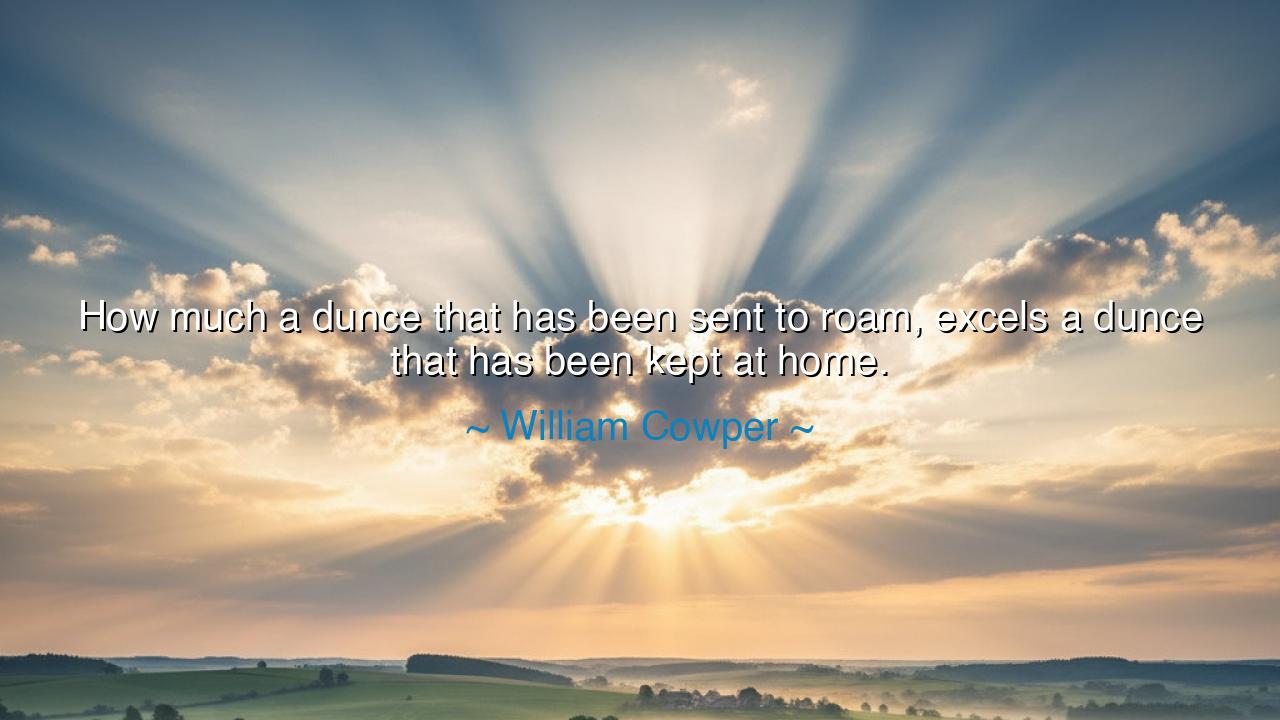
How much a dunce that has been sent to roam, excels a dunce that
How much a dunce that has been sent to roam, excels a dunce that has been kept at home.






In the words of William Cowper, “How much a dunce that has been sent to roam, excels a dunce that has been kept at home.” — there hides a wisdom both gentle and profound, woven with the wit of a poet who understood the education of the soul. His words, though light with humor, carry the weight of truth: that even the most limited mind is sharpened by the journey, and that experience, though it may not make a genius, will always refine the dullest of stones. In this saying, Cowper declares that travel, movement, and exposure to the world are teachers greater than any book, and that to live only within one’s narrow circle is to remain forever in ignorance.
The origin of this quote lies in Cowper’s poem The Progress of Error, written in the 18th century, a time when the British world was expanding — through exploration, commerce, and empire — yet many still clung to small, parochial lives. With the sharp pen of satire, Cowper observed how even the foolish man, when sent abroad, returns with broader thought than one who never left his doorstep. It is not the journey of the body alone he praises, but the journey of the mind, the encounter with diversity, challenge, and change. The dunce who “roams” may still be limited, but he has seen — and in seeing, he is wiser than the one who knows nothing beyond his own village.
The ancients knew this truth long before Cowper gave it verse. They taught that travel is the crucible of wisdom. Herodotus journeyed across empires to record the customs of the known world; Odysseus, the wandering king, returned home not as he left it — rash and proud — but tempered by trial, cunning, and humility. Even in folly, the traveler finds knowledge, for the world itself is the greatest of classrooms. The one who stays at home may recite what he has heard, but the one who roams can speak what he has lived. Thus, the poet’s jest becomes a law of human growth: that exposure expands even the smallest mind, while isolation shrinks even the greatest one.
Consider the story of Marco Polo, who left Venice as a youth and returned twenty-four years later, transformed not by wealth but by wonder. The tales he brought from the courts of Kublai Khan reshaped the imagination of Europe. To many, his accounts seemed too fantastic to believe — yet they were the visions of a man who had seen beyond the horizon of his world. Even if Polo had been a fool when he departed, his eyes and heart would have been opened by what he saw. Cowper’s “dunce who roams” is thus not a mockery of ignorance, but a celebration of learning through experience, of the mind awakened by contact with the vastness of creation.
There is also humility in Cowper’s insight. He does not say that travel makes the dunce a scholar — only that it makes him excel the one who stayed behind. For not all who travel learn, and not all who remain at home are ignorant. But the poet’s wisdom lies in this: that to venture, to seek, to confront the unknown is itself an act of growth. The dunce who roams may stumble, err, and misunderstand, yet through his movement he gains perspective, contrast, and empathy. The dunce who stays, by contrast, remains stagnant — his world bounded by walls, his thoughts by habit. The lesson is clear: one need not be brilliant to benefit from the world; one need only be willing to step into it.
In these words we find the eternal tension between comfort and curiosity. The home represents safety — the known, the familiar — but it is also the cradle of complacency. The road, on the other hand, is risk: it offers danger, but also transformation. Cowper invites us to understand that wisdom is not inherited; it is encountered. The traveler, by seeing other lands and peoples, learns the great secret that all humanity shares the same essence beneath differing tongues and customs. To remain unmoved, both in body and in thought, is to miss this revelation — to mistake the boundaries of one’s experience for the boundaries of the world.
Let us take from Cowper’s words a lesson for our own lives: never be content to be the “dunce at home.” If you cannot roam across oceans, then roam across ideas; if you cannot travel far in body, then travel deeply in mind. Read, listen, question, and venture beyond the comfort of your certainty. Every conversation, every encounter with difference, is a journey that enriches the spirit. The wise soul knows that ignorance is not cured by pride but by movement — by opening the eyes, the heart, and the will to learn.
For as William Cowper reminds us, even the least gifted grows wiser by engaging with the world. The journey itself — with its confusions, discoveries, and humbling lessons — is the true education of the human heart. So go forth, dear listener, not waiting for perfection but seeking perspective. Let experience be your teacher, for the one who dares to roam — even clumsily, even fearfully — will always stand higher than the one who never left the threshold of the familiar. For the world, vast and varied, was made to be known — and in knowing it, we become more fully human.






AAdministratorAdministrator
Welcome, honored guests. Please leave a comment, we will respond soon